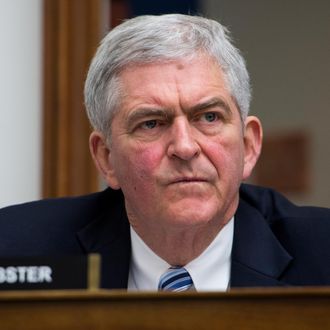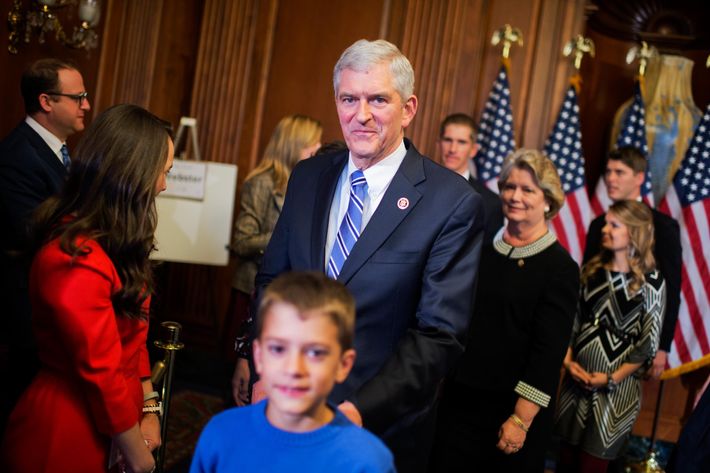
In a little over a month, House Speaker John Boehner will step down from Congress and commence a retirement that seems likely to involve an office on K Street and a big jump in his net worth. Before he packs his bags, Boehner hopes to see Representative Kevin McCarthy voted in as his successor. But standing in his way is the same caucus of recalcitrant reactionaries who pushed him into early retirement. As of today, they have a Speaker candidate to throw their weight behind: Representative Daniel Webster of Orlando, Florida.
Here’s an introduction on the Florida Man — who happens to share a name with a far more accomplished New Hampshire man — looking to inherit Boehner’s gavel.
This isn’t his first time running: Less than 24 hours before the House voted for Speaker last January — handily reelecting Boehner — Webster threw his hat into the ring. For weeks, a group of rogue conservatives had been trying to orchestrate a coup, but they struggled to find anyone willing to accept the political costs of an almost-certain defeat. Webster finally took on the suicide mission, and ended up finishing in second place with 12 votes — only 206 short of ousting Boehner.
Doing so cost Webster his seat on the Rules Committee. But his willingness to come at the king and miss bolstered his reputation with Boehner’s skeptics in the House’s tea-party-driven “Freedom Caucus.”
His base is Florida’s evangelical community: Before being elected to Congress, Webster spent nearly three decades in the Florida state legislature. For two of those years, he served as the Speaker of Florida’s House of Representatives — a résumé item that he has touted heavily.
Many of Webster’s signature political fights in Tallahassee centered around issues near and dear to the state’s evangelical community. As a member of the Florida House, he helped legalize homeschooling, allowing evangelical families to spare their children from a “Godless” public education. This isolationist philosophy was nurtured, in part, by his close relationship with disgraced evangelist and sexual harasser Bill Gothard, who also mentored the reality-TV stars/molestation-enablers the Duggar family.

His pitch is focused more on legislative process than on ideology: On key matters of national politics, Webster offers little contrast with Establishment favorite McCarthy. For instance, when it comes to the principle issue dividing the GOP’s business and populist wings — immigration — Webster sides with the Establishment: In 2013, he endorsed a version of immigration reform that included a pathway to citizenship for unauthorized immigrants.
Rather, Webster’s pitch centers on democratizing the lawmaking process.
“The principle is that every member needs to represent their district,” Webster told Fox & Friends this morning. “And so, if there’s a pyramid of power that dishes to you everything that you’re going to get a chance to vote on and tell you, you know, you can offer amendments today, but tomorrow you can’t, and not take up all of the bills, that’s a power-based system.”
Instead of a “power-based system,” Webster proposes one based on the principle that all members, no matter their seniority, deserve the opportunity to add amendments that will bolster their approval at home.
A more open process could certainly empower the Freedom Caucus by freeing them up from the constraints put on them by party leadership.
He will almost certainly lose his bid for the speakership this fall — and possibly his congressional seat in 2016: Webster’s path to replacing Boehner begins, of course, with the Freedom Caucus. If he can earn the support of 80 percent of the members, the entire group will vote for him in a block.
But even then, Webster would have an uphill battle getting the 218 votes he’ll need. McCarthy is not only the Establishment’s handpicked heir — he also boasts significant support among the House’s tea-party contingent. Before Boehner announced his plan to resign last week, several conservative House members were hoping to bring McCarthy to power through a coup. While he hews closer to the business-wing ideologically, many of the House’s young tea-party members owe their jobs to McCarthy.
Beyond that, Webster’s own seat in Congress may soon be in jeopardy. Florida’s congressional map is about to be shuffled again, meaning Webster will compete in a new district for the third time in six years. His securely red tenth district will most likely be merged with Florida’s deep blue fifth congressional district, one of the most gerrymandered in the United States.
Webster’s bid for Speaker may in truth be less about gaining power than retaining it, a gambit to increase his national profile ahead of a tough reelection fight in 2016. Conventional wisdom suggests he doesn’t stand a chance. But then again, if conventional wisdom about the modern GOP always held up, Eric Cantor would be House Majority Leader and Donald Trump would be preparing for the next season of Celebrity Apprentice.





























